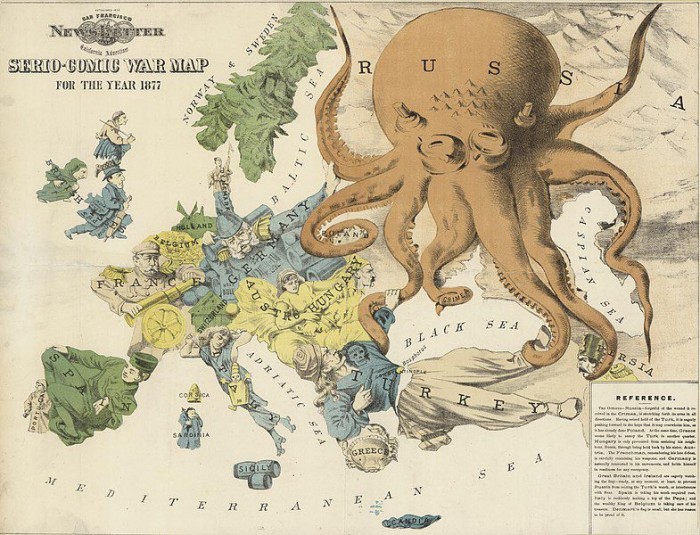Russia’s Hybrid War Simulates the Colonial Past
Adel Bashqawi
9 March, 2022
The strategy and objectives of Russian wars have not changed since the reign of Ivan the Terrible, a scion of the Rurik family, and Prince of the Muscovites, who crowned himself as Tsar in the 16th century, nor when a descendant of the Romanov family, Peter the Great, founded the Russian Empire in the 18th century. It remained so, even after the emergence of the October Revolution in the twentieth century and the establishment of the Soviet Union with its fifteen republics, until its decline after 69 years of totalitarian rule, and until the establishment of the independent post-Soviet States, one of which was the Russian Federation, which consisted of dozens of small peoples and nations.
Ukraine was one of the republics that gained independence from the Soviet Union in 1991, but unfortunately, in the absence of diplomacy and civilized values, and with the beginning of the Russian invasion of Ukraine, known as “Putin’s War”, it appeared to be a continuation of the policies of successive Russian regimes that they practiced against dozens of peoples and nations. They were only milestones in the style of war and the type of Russian military operations against the homelands of other nations, now against an independent state in the twenty-first century.
The military attacks and raging battles on the approaches access to strategic and coastal areas on the Sea of Azov and the Black Sea, and cities up to the capital Kyiv, did not differ from the killing, destruction, occupation, extermination and displacement, which the Russian Empire practiced against the Circassian nation and other peoples in the Caucasus in the nineteenth century. Same techniques were repeated by successive Russian regimes, considered milestones in the style of war and the Russian invasion of the homelands of oppressed nations. The first and second Chechen wars were other examples of brutal bombing and unprecedented massive destruction of civilian areas.
We cannot fail to mention dealing with Russian citizens who reject the unjustified war, and the rude and inhumane treatment that lead to the arrest of thousands of demonstrators in Moscow, Saint Petersburg and other Russian cities. By day 14 of the Russian military operations, strict economic sanctions on oil and gas have been imposed by the European Union countries, the United States, the United Kingdom, Canada, Japan, South Korea and others. Also, key sectors of the Russian economy are targeted, while imposing unprecedented financial restrictions and sanctions. The unavoidable sanctions, have led to the rise of oil and gas prices, as well as the impact on wheat prices, considering that Ukraine and Russia are among the largest exporters close to the Middle Eastern and African markets and consumers, which will lead to great difficulties for importers.
Knowing that some military and strategic observers have stated that the Ukrainian volunteers formed a solid resistance, which came against the initial expectations, as it surprised the Russian forces that entered the Ukrainian quagmire, from which it is difficult to get out in peace. This is an unsuccessful war, according to a a statements from a Russian intelligence officer and other commentators and observers from various countries. Despite holding three rounds of fruitless negotiations between the two parties on the Ukrainian-Belarusian border, the obstacle in achieving any success is the unacceptable Russian demands and conditions.
In conclusion, while criticizing what is happening in Ukraine, the permanent representative of Albania to the United Nations has said in his speech before the UN Security Council session on 7 / 3 / 2022, that “Russia silenced most media outlets and stifled freedom of information,” thus resembling the current Russia to the past, and the need for pluralism.

